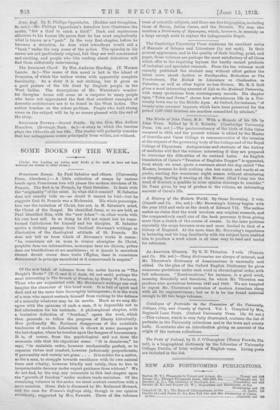Of the new batch of volumes from the series known
as "The People's Books " (T. C. and E. C. Jack, ed. net each) perhaps the most interesting is The Growth of Freedom, by Henry W. Novineon. Those who are acquainted with Mr. Nevinson's writings can well imagine the character of this brief work. It is full of spirit and dash and at the same time thoroughly intemperate ; it is the work of a man who cannot restrain himself from rushing to the defence of a minority whatever may be its merits. Much as we may dis- agree with the opinions of such a man, it is impossible not to feel admiration for his instincts. A philosophical chapter, with a tentative definition of "freedom," opens the work, which then proceeds to follow the progress of liberty historically. How profoundly Mr. Nevinson disapproves of the socialistic tendencies of modern Liberalism is shown in some passages in the last chapter, where he touches upon the dangers of bureaucracy. It is, of course, from the psychological and not from the economic side that his objections come. " It is disastrous," he says, " to maintain order, however mechanically perfect, or to organize virtue and comfort, however judiciously proportionate, if personality and variety are gone. . . . It is nobler for a nation, as for a man, to struggle towards excellence with its own natural force and vitality, however blindly and vainly, than to live in irreproachable decency under expert guidance from without." We do not find, by the way, any comments in this last chapter upon the "growth of freedom " under modern trade unionism. Of the remaining volumes in the series we must content ourselves with a mere mention. Home Rule is discussed by Mr. Redmond Howard, and the case for Women's Suffrage ably, though in our opinion mistakenly, supported by. 111..s. Fawcett. Three of the volumes
treat of scientific subjects, and there are five biographies, including those of Bacon, Julius Ccesar, and tho Brontee. We may also mention a Dictionary of Synonyms, which, however, is scarcely on a large enough scale to replace the indispensable Begot.










































 Previous page
Previous page